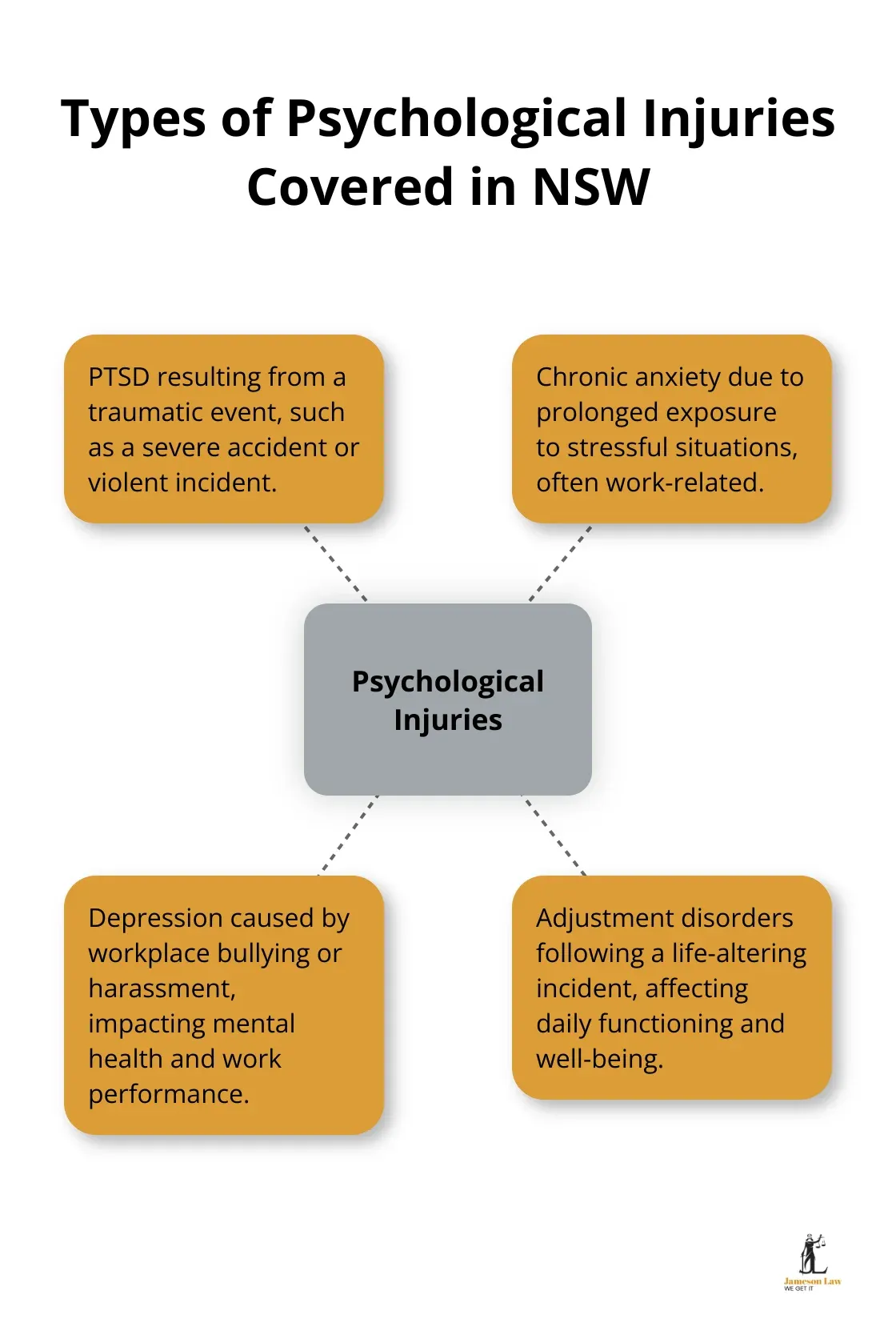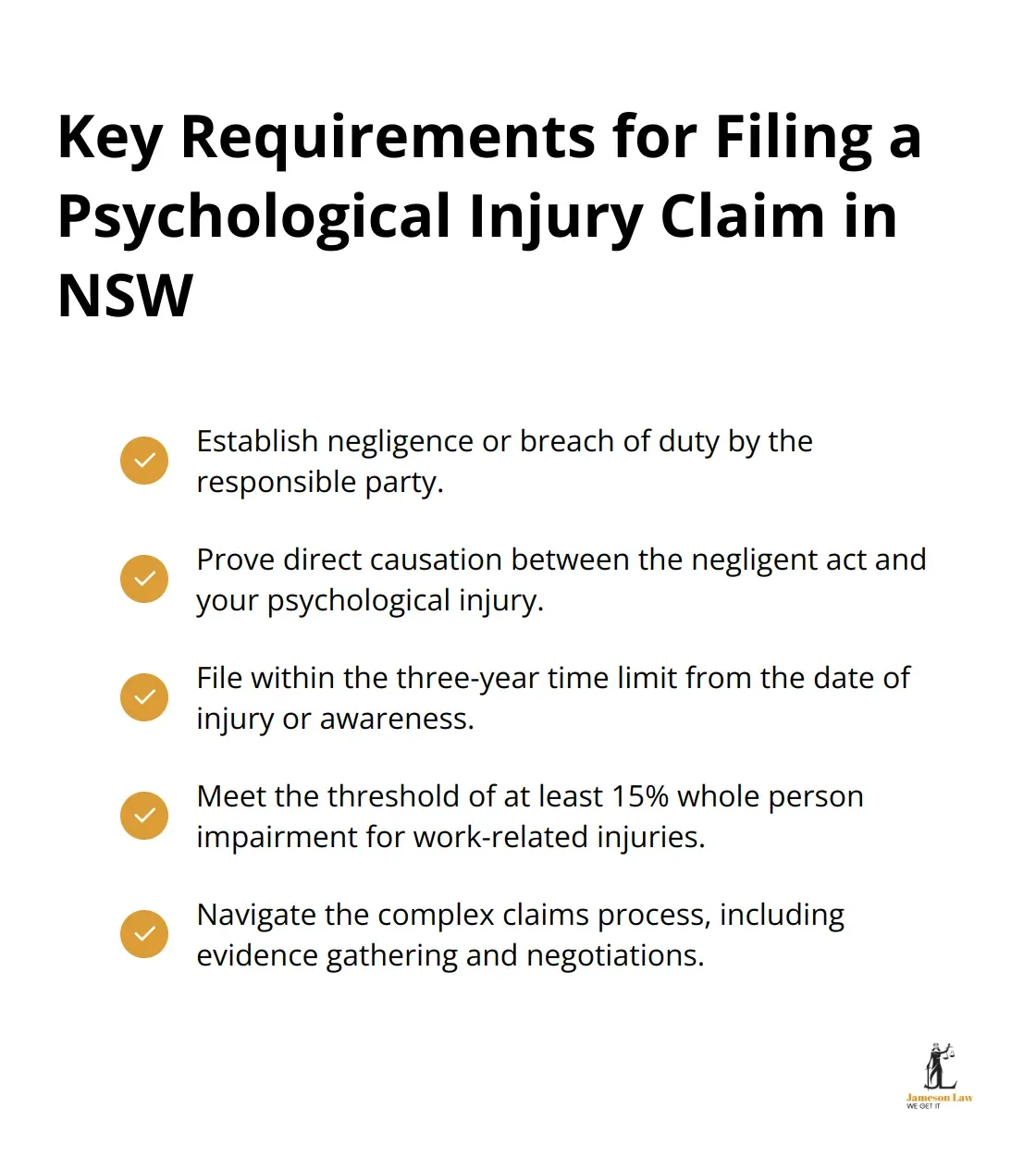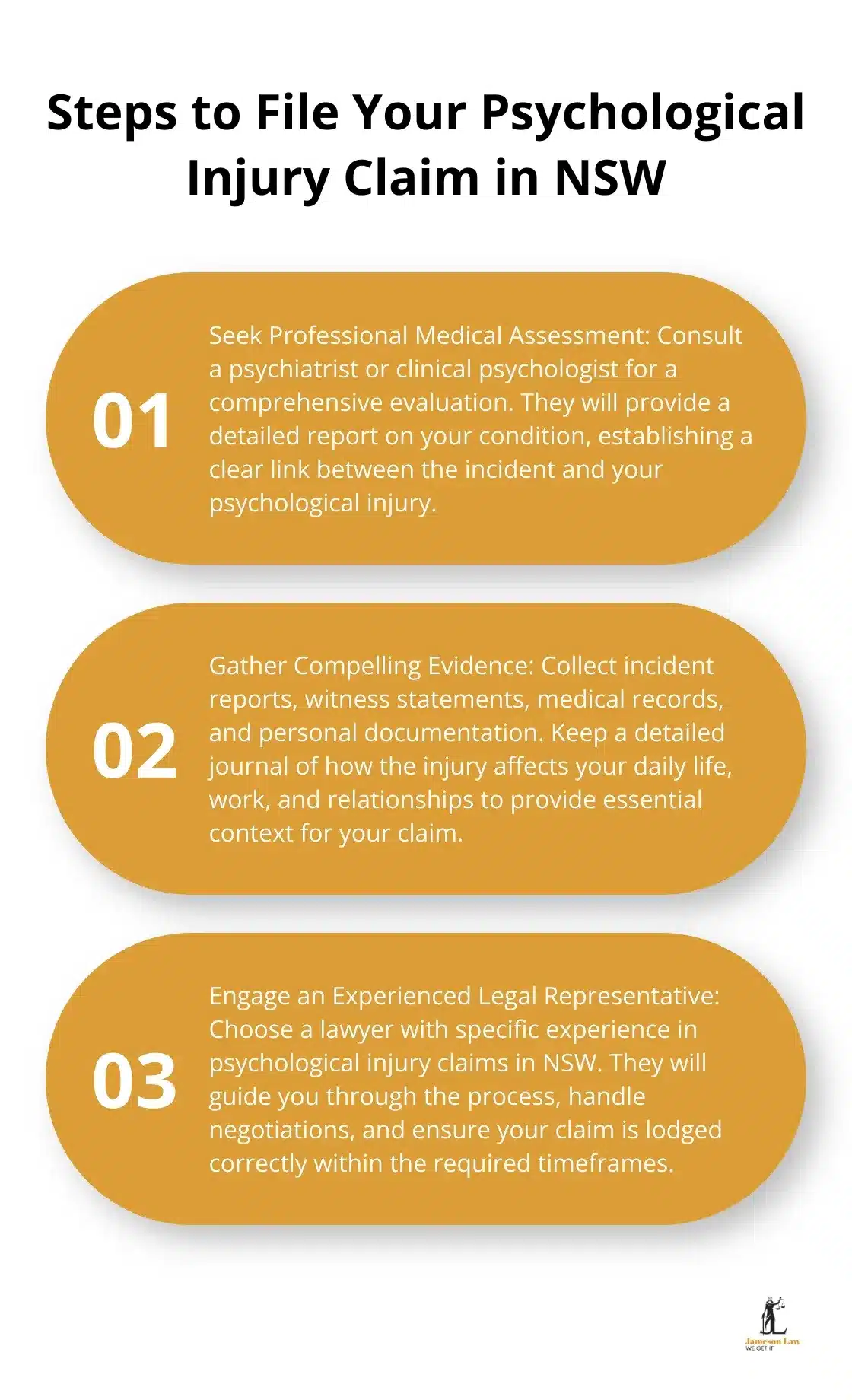Psychological injuries can have a profound impact on a person’s life, affecting their work, relationships, and overall well-being. In New South Wales, individuals who have suffered such injuries due to someone else’s negligence may be eligible to file common law claims for psychological injury.
At Jameson Law, we understand the complexities of these cases and the challenges faced by those seeking compensation. This guide will walk you through the process of filing psychological injury claims in NSW, providing essential information to help you navigate this difficult journey.
Understanding Psychological Injury Claims in NSW
Legal Definition of Psychological Injury
In NSW law, a psychological injury refers to a recognised psychiatric condition that significantly impacts a person’s mental health. This includes conditions such as post-traumatic stress disorder (PTSD), depression, anxiety disorders, and adjustment disorders. To make a compensation claim for stress, you must have a diagnosable psychological disorder. See the NSW guidelines for workers’ compensation psychological injuries via SIRA (NSW State Insurance Regulatory Authority) and national context from the Australian Institute of Health and Welfare (AIHW).
Types of Psychological Injuries Covered
Common law claims in NSW can cover a wide range of psychological injuries, including:
![]() PTSD resulting from a traumatic event
PTSD resulting from a traumatic event
![]() Chronic anxiety due to prolonged exposure to stressful situations
Chronic anxiety due to prolonged exposure to stressful situations
![]() Depression caused by workplace bullying or harassment
Depression caused by workplace bullying or harassment
![]() Adjustment disorders following a life-altering incident
Adjustment disorders following a life-altering incident
For evidence-based information on symptoms and diagnosis, refer to NSW Health mental health services and the ABS National Study of Mental Health and Wellbeing.

Common Law Claims vs Workers Compensation
Workers’ compensation operates on a no-fault basis for work-related injuries and is overseen in NSW by SIRA. Common law claims may allow broader damages (e.g. pain and suffering, economic loss) but require proof of negligence or breach of duty. For workplace psychosocial hazards obligations, see Safe Work Australia. For community support resources, visit Black Dog Institute or Beyond Blue.
Proving Psychological Injury Claims
To file a successful psychological injury claim in NSW, you must demonstrate that:
![]() The defendant owed you a duty of care
The defendant owed you a duty of care
![]() They breached that duty through negligence or wrongful act
They breached that duty through negligence or wrongful act
![]() This breach directly caused your psychological injury
This breach directly caused your psychological injury
![]() Your injury resulted in measurable damages
Your injury resulted in measurable damages
For background on employer duties and negligence principles, see the Civil Liability Act 2002 (NSW) and our guide to successful psychological injury claims.
Time Limits for Filing Claims
NSW law generally imposes a three-year limit from the date of discoverability to commence a court claim for personal injury. Workers’ compensation notification and claim timeframes are set out by SIRA. For tailored advice about your limitation dates, contact Jameson Law as early as possible.

Key Requirements for Filing a Psychological Injury Claim in NSW
Establishing Negligence or Breach of Duty
Negligence requires showing that a reasonable person (or employer) would have taken precautions against a foreseeable risk. Guidance on managing psychosocial risks is available from Safe Work Australia and Fair Work Ombudsman (bullying & harassment). Legal strategy for negligence claims: Common law claims.
Proving Causation
Link the negligent act to your diagnosed condition using specialist reports and corroborating evidence. See our evidence checklist: compensation claims in NSW. For clinical standards and referral pathways, refer to NSW Health and community guidance from Beyond Blue.
Threshold for Serious Injury (work-related)
Work-related psychological injury lump sum eligibility and impairment assessment are administered by SIRA impairment guides. Preparation with a personal injury lawyer ensures your symptoms and functional impact are fully documented.
Time Limits & Reporting
Report early and seek advice promptly. Workers should follow SIRA’s claim steps. For civil limitation rules, consult the Limitation Act 1969 (NSW) and our overview on filing injury compensation claims.
How to File Your Psychological Injury Claim
Seek Professional Medical Assessment
Obtain an assessment from a psychiatrist or clinical psychologist. Clinical resources: NSW Health and national data context via the AIHW. Legal pathway overview: how to file common law claims.
Gather Compelling Evidence
Collect incident reports, emails, HR complaints, witness statements, and a personal symptom diary.
![]() Use SIRA’s guidance on claim documentation: what happens when you make a claim
Use SIRA’s guidance on claim documentation: what happens when you make a claim
![]() Refer to our NSW psychological injury success guide
Refer to our NSW psychological injury success guide
![]() Check Safe Work Australia on psychosocial hazards: safeworkaustralia.gov.au
Check Safe Work Australia on psychosocial hazards: safeworkaustralia.gov.au
Engage an Experienced Legal Representative
Choosing the right solicitor is crucial. At Jameson Law, we specialise in compensation claims and No Win No Fee arrangements. For workplace bullying definitions and rights, see the Fair Work Ombudsman.
Lodge Your Claim Correctly
Your lawyer will prepare and file the Statement of Claim in the appropriate NSW court (District or Supreme, depending on value/complexity). Review SIRA’s step-by-step for injured workers: Injured at work. For broader personal injury timeframes, see how to file a compensation claim and the NSW legislation website.

Final Thoughts
Filing common law claims for psychological injury in NSW requires meticulous preparation, comprehensive medical evidence, and skilled legal representation. Early action preserves evidence and protects your rights. For practical support, start with NSW Health services and national insights from the AIHW, then get tailored legal guidance from Jameson Law.
Our team of No Win No Fee solicitors specialises in psychological injury claims and will work to secure fair compensation for medical expenses, lost earnings, and pain and suffering. Your mental health and rights matter—reach out to Jameson Law for expert help today.













